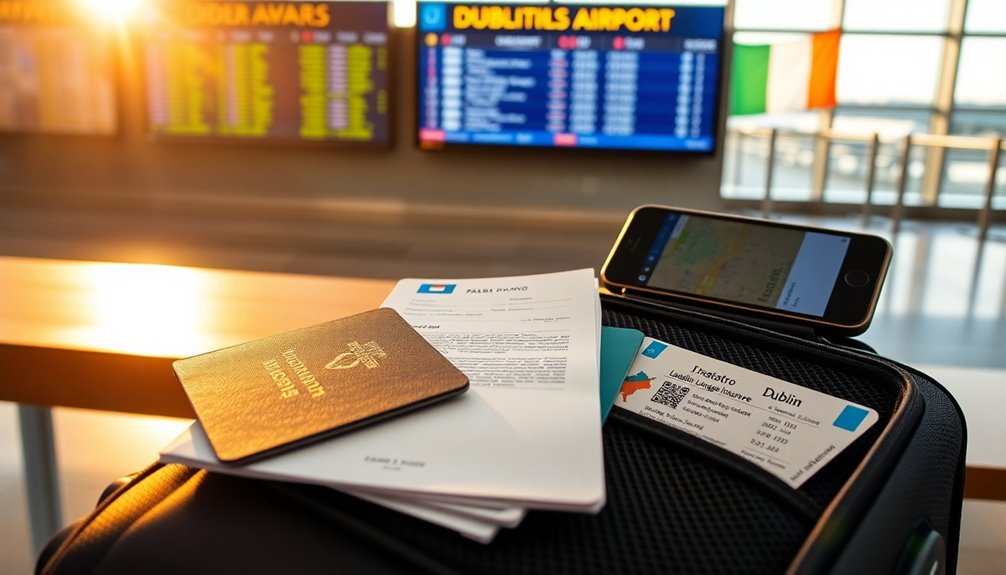
You can apply to accredited English schools in Ireland by choosing a recognized course, checking age and minimum-English requirements, and confirming visa rules for your nationality. Gather passport, photos, transcripts, and proof of funds, then complete the school’s online application and upload documents. Monitor email for an offer letter that lists course details and visa eligibility, accept promptly, and keep certified copies for your visa application. Continue for step-by-step guidance on visas, travel, and settling in.
Why Choose Ireland for English Language Study
Because Ireland combines high-quality teaching with a warm, English-speaking environment, it’s an excellent place to improve your language skills quickly. You’ll benefit from teachers who follow recognized standards and a strong academic reputation that supports reliable learning outcomes. Small class sizes mean you’ll get focused feedback, and structured courses let you progress at a predictable pace.
You’ll also gain cultural immersion through everyday interactions — in cafes, public transport, and community events — which reinforces classroom learning in safe, manageable steps. Ireland’s friendly atmosphere and clear codes of conduct make it easier to navigate social situations confidently. Practical support services, including student advisors and emergency contacts, are widely available, so you can plan for wellbeing and security while studying. By choosing Ireland, you’re selecting a supportive setting where quality instruction and real-world practice combine to build your English ability steadily and securely.
Researching Accredited English Schools and Courses
When you start researching accredited English schools and courses in Ireland, focus first on official recognition and course content so you can compare quality and outcomes reliably. Look for accredited institutions listed by Ireland’s educational authorities or recognised quality assurance bodies; that verification reduces risk and guarantees a consistent standard of teaching. Check detailed course offerings — hours, syllabus, class size, assessment methods and any certificate awarded — so you know what skills you’ll gain and how progress is measured. Read recent student reviews and inspection reports to confirm safety, support services, and realistic outcomes. Contact schools with specific questions about pastoral care, emergency procedures and accommodation options; a prompt, clear response indicates reliable administration. Finally, compare fees, refund policies and what’s included (materials, social activities, testing) to avoid surprises. Keeping a documented comparison will help you choose a trustworthy program that matches your learning goals and provides the safeguards you need.
Checking Entry Requirements and Visa Eligibility
How do you know if you’re eligible to study English in Ireland? Start by checking the school’s published entry requirements: age limits, minimum English level, and any health or insurance obligations. Accredited schools list these clearly; if anything’s unclear, contact the admissions office so you’re certain before applying.
Next, confirm visa eligibility for your nationality. Short courses under 90 days may not need a visa; longer stays usually require a student visa or long-stay permission. Review Ireland’s immigration website for the latest visa process steps, timelines, biometric requirements, and processing fees. Note any restrictions on work, course length, and extension rules that affect safety and planning.
Keep copies of official confirmations and correspondence, and ask the school for guidance on the visa process if they offer a student support service. Following official checklists and verifying deadlines helps you stay safe, compliant, and prepared throughout admission and travel.
Preparing Application Documents and Proof of Funds
Although gathering documents can feel challenging, getting your application folder in order early makes the visa and admission steps much smoother. You’ll want a clear application checklist: passport copy, recent photos, academic transcripts, English test results, and any medical or police-clearance certificates the school or embassy requires. Keep original documents and certified copies organized in labeled folders or scans stored securely online.
For financial documentation, prepare bank statements, sponsor letters, scholarship proof, and a clear budget showing you can cover tuition, living costs, and return travel. Make sure statements are recent, translated if needed, and include bank contact details for verification. If a sponsor supports you, include an affidavit of support and their financial proof.
Double-check requirements on school and embassy sites, and make certified translations where required. Keep copies for yourself and have a backup plan if a document needs replacement; being thorough reduces stress and protects your visa and admission prospects.
Applying to Schools and Securing an Offer Letter
With your documents and proof of funds organized, you’re ready to start applying to schools and aim for an offer letter that meets visa requirements and your academic goals. Begin by researching accredited English schools, checking course length, start dates, and safety records. Follow each school’s application process precisely—complete online forms, upload certified documents, and pay any fees. Keep copies and track submission dates in a checklist so nothing’s missed.
After submission, monitor your email and school portals for requests for clarification or additional paperwork. If an interview is required, prepare concise answers about your study plans and funding; treat it as part of the application process. Once you receive an offer letter, confirm it includes course details, tuition, duration, and conditions tied to visa eligibility. Accept or request amendments promptly and request a formally signed copy for your records. This careful approach reduces delays and helps you secure a secure, compliant offer letter.
Applying for an Irish Student Visa and Travel Arrangements

Before you book flights, you’ll need to apply for the appropriate Irish student visa and confirm your travel timelines; start by checking the Irish Immigration Service (INIS) requirements and the specific visa type that matches your course length and status. Get your offer letter, passport, proof of funds, and any required medical or police clearances ready before starting the visa application online. Apply early — processing can take weeks — and track your application’s progress so you can adjust travel plans safely.
Once your visa is granted, arrange stable travel: choose reputable airlines, allow buffer days before classes, and keep digital and printed copies of your visa and offer letter. Buy extensive travel insurance that covers health, delays, and baggage; make sure it’s valid from your departure date. Share your itinerary with a trusted contact and confirm local transport options from the airport to prearranged accommodation. Taking these steps reduces last-minute risks and helps you arrive prepared and protected.
Arriving in Ireland and Settling Into Student Life
Arrival day can feel overwhelming, but you’ll settle faster if you follow a short checklist: clear immigration, collect any checked luggage, buy a local SIM or activate your roaming, and exchange a small amount of cash for immediate needs. Once you’ve left the airport, take a trusted taxi or pre-booked transfer to your accommodation, keep emergency numbers handy, and check in with your host or residence manager.
In the first week, register with your school’s student support office, obtain a local bank account, and familiarise yourself with public transport routes and timetables. Expect cultural adjustment — join orientation events and meet other students to reduce isolation. Keep important documents safe, copy them digitally, and learn how to contact local emergency services. Balance exploring with rest so you don’t burn out. Use campus resources for mental health, academic help, and housing advice; they’re there to help you feel secure and connected as you start student life in Ireland.
Some Questions Answered
How Do I Transfer Between English Schools in Ireland Mid-Course?
You can transfer mid-course by first checking the transfer process with both schools and confirming you meet the new school’s requirements. Contact your current school for release paperwork and get written acceptance from the new school. Make sure visas, attendance and fee records are in order, and ask about any course credit transfers. Keep copies of all documents, notify immigration if needed, and confirm start and end dates so your move’s safe and compliant.
Can I Work Part-Time While Enrolled in a Short-Term English Course?
Generally, you can’t work part-time while enrolled in a short-term English course in Ireland; visas and work regulations usually restrict employment to longer courses. You should check your specific visa conditions and school contract, since student rights include clear information and support. If work’s essential, consult immigration services or your school’s student welfare officer to explore safe options or longer-course alternatives so you comply with rules and protect your legal status.
What Health Insurance Options Exist for Short-Term International Students?
You can choose between private insurance options or limited public health coverage, depending on your stay. You’ll often need private travel or student policies to cover medical, repatriation, and liability; these’re straightforward to buy before arrival. If you qualify for any public health coverage, it’s usually restricted and may not cover everything, so check specifics. Always carry proof of coverage, know emergency numbers, and keep policy details handy for peace of mind.
Are There Language Exam Exemptions for Certain Nationalities or Educational Backgrounds?
Can some students skip tests if they’ve already studied in English-speaking systems? Yes — you’ll often find language proficiency requirements waived for applicants with certain nationality exemptions or who’ve completed recognized education in English. You’ll need acceptable documentation, like transcripts or a school letter, and schools may still assess your level. Check each institution’s policy, confirm accepted evidence, and keep records to protect your application and guarantee a safe, smooth process.
How Can I Extend My Visa to Continue Studying English in Ireland?
You can extend your visa by following the visa extension process: apply to INIS/Immigration before your current permission ends, submit proof of continued enrolment, financial means, and meet eligibility requirements (course length limits, attendance). You’ll need police/medical clearance if required, passport photos, and application fees. Keep documents organized, apply early, and check for any student-capacity or language-school-specific rules so you stay compliant and safe while continuing studies.
Summing Everything Up
You’ve done the homework — from choosing Ireland and vetted schools to gathering documents, proving funds, and applying for your visa — and now you’re ready to take the plunge. Expect a few bumps as you arrive, but lean on school support services and fellow students to get settled quickly. Keep important documents handy, explore local resources, and embrace the experience; before you know it, you’ll be speaking confidently and feeling right at home.
